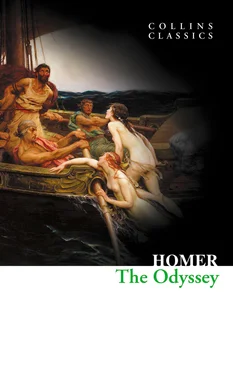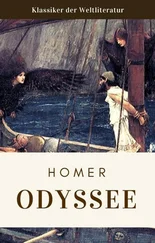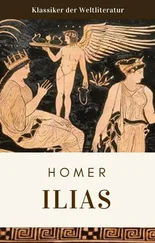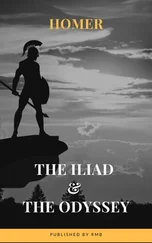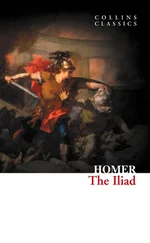1 ...6 7 8 10 11 12 ...23 ‘I held on for Pylos, helped thereto by the friendly wind which never once let up on us from the first day when the god caused it to blow. Thus easily, dear lad, did I return home by myself, without learning the fate of the other Achaeans or knowing who was saved and who was lost. What news I have gathered since, sitting quietly in my great hall, that shall you now learn from me without exception, as is your due.
‘The Myrmidons, they say, those spearmen, got back in good order under the renowned son of great-hearted Achilles. It was well, also, with Philoctetes, gallant son of Poias: and Idomeneus brought back all his company to Crete: – all, that is, who escaped the war. The sea wrested none from him. Of the fate of Agamemnon, son of Atreus, word must have come, even to those remote fastnesses which are your home, relating the calamity of his return to the woeful fate Aegisthus had schemed for him. Yet Aegisthus paid a reckoning even more terrible. How good it was that a son of the victim survived, and that he should avenge his great father’s cruel death upon Aegisthus, the sly murderer! Fortify yourself, my tall and comely friend, upon his example: that your praises may be sung by posterity.’
Telemachus answered him gravely, ‘Nestor, son of Neleus, chief glory of the Achaeans: I grant you that young Orestes took the last drop of his revenge; and therefore shall the Achaeans indeed trumpet his fame, for ever and ever. Would that the Gods had endowed me with strength like his, to visit upon the lawless suitors these iniquitous presumptions with which they artfully insult my feebleness. But when the Gods spun the web of fate for me and for my father they made no such blissful provision of power for us. Our part is only to endure.’
Then said Nestor of Gerenia, master of the horse: ‘Friend, now you open this matter and make mention of it to me, let me admit that I have heard how your palace is beset by a mob of those who would marry your mother: and that they plot to your disadvantage, in your despite. Tell me, do you willingly yield to them? Or is it that some divine will has made the people of your part to turn against you? Who knows, perhaps one day HE will arrive and reward their violence with violence upon themselves: as he can do equally, whether he come alone or with the might of Achaea at his back. Furthermore, should the grey-eyed Athene single you out to cherish, with the loving care she bore famous Odysseus in the Troad where we Achaeans suffered – never saw I such open affection on the part of the Gods as was there displayed by Pallas, who would stand openly by his side – if Pallas will so love you and vex her heart for you, then may one or two of them be distracted clean out of the idea of marriage!’ Telemachus replied sadly, ‘Reverend Sir, I do not think this word of yours can live. Your saying is too great. So much too great that I grow afraid. Not all my hoping, not the good-will of the Gods, could bring it about.’
Here Goddess Athene broke in. ‘Telemachus, it is unseemly to let such words escape past the barriers of your lips. When a God wishes, it is idly easy for him to preserve a man, even in the ends of the earth. For my part I should choose to be vexed with every sort of pain on my way home, so that I reached there at last and enjoyed my return: rather than get back just to meet death at my fireside, as Agamemnon died through the treachery of his wife and Aegisthus. Yet I grant you that not the immortal gods themselves can for ever shield the man they love from the common meed of death, or continually avert that fatal decree which lays every man prone in the grave at the end.’
Telemachus answered after his wont, ‘Mentor, we will speak no more of it. Why harrow ourselves imagining returns for him, when already the Deathless Ones have given him death and the dark which follows it? But see, I wish to change the topic; and ask another word of Nestor, as from one whose rulings and conclusions have final authority. They tell me he has been King for thrice the span of ordinary generations. By this virtue he seems to my gaze almost an immortal himself. So Nestor, son of Neleus, give me more true history – how died that great king, Agamemnon, son of Atreus? By what subtleties of device did Aegisthus snare into death a man so much better than himself? Where was Menelaus in the business, that Aegisthus dared to kill? Absent perhaps, wandering abroad in the world far from Achaean Argos?’
Nestor of Gerenia, the exceeding rich in horses, answered, ‘My child, I can tell you the whole truth of it. You have rightly guessed how it would have been had tawny Menelaus, Agamemnon’s brother, come back from Troy to find Aegisthus alive in his brother’s place. There would have been no corpse to need the kindly rites of burial. Dogs and carrion crows would have torn the carcase to tatters in the open fields beyond the city walls: nor would any of our women have keened over him, so abhorrent was the man’s crime.
‘We were away, you see, fighting our great fights at this siege, while he, comfortable in the heart of Argos and its green horse-pastures, was ever speaking in the ear of Agamemnon’s wife, trying to steal her love. For long she would not abide the foul thing, Clytemnestra the divinely fair, the noble-minded. Besides there was ever at her side the family minstrel, whom Atrides, before he left for Troy, had told off to protect his wife.
‘Yet the doom of the Gods linked her with disaster after all. Aegisthus lured the singing man to a desert island and there abandoned him to be a spoil and booty for the birds of prey. Whereupon her lust matched her lover’s, and he took her into his house. Many thigh-bones of oxen he burned to the gods on their holy altars: and many dedications of tapestries or gold he made, in thankfulness for the momentous success he had achieved beyond his heart’s hope.
‘Then we came sailing back together, Atrides-Menelaus and I, fast friends. But at Sunium, the sacred headland of Athens, Phoebus Apollo shed down his gentle darts upon Menelaus’ navigator and ended his life. He dropped dead, with the steering oar of the moving ship yet within his hands. This Phrontis, son of Onetor, excelled all the men of his trade in skilfully holding a ship to her course when squalls bore down thick and heavy. So Menelaus was delayed there, in spite of his anxiety to be moving, till he had given due and rich burial to his henchman. Then at last he got away across the wine-dark ocean, at the best pace of his hollow ships, as far as the steep slope of Maleia. There however, Zeus the far-seeing swept him grievously astray by loosing upon the fleet a blast of piercing winds and monster waves which grew mountainous.
‘The squadron was torn asunder. Some ships the God thrust almost to that part of Crete where the Kydonians live beside the streams of Iardanus. When the wind sets from the south-west, a long swell drives in there against the smooth wall of cliff which sheerly fronts the mist-veiled sea, from the furthest end of Gortyn westward to the promontory by Phaestos: where a low reef stems the whole sweep of the tide. Upon this came the half of the fleet. The ships were shattered by force of the waves against the crags: and the men in them narrowly avoided death.
‘As for the rest of the dark-prowed fleet, the other five vessels, – they were borne by wind and water to the coasts of Egypt; in which strange region, with its foreign people, Menelaus lingered, amassing great store of gold and goods, all the while that Aegisthus at home was carrying out his dastard scheme. Therefore it chanced that he had seven years of rule in golden Mycenae after killing Atrides: and all the people served him. But in the eighth year there returned from Athens the goodly Orestes to be his undoing. For Orestes killed the traitor Aegisthus, his father’s murderer: a son slaying the sire’s slayer. After perfecting his vengeance Orestes gave a funeral feast to the Argives over the bodies of the mother he hated and despicable Aegisthus: and that self-same day there sailed in Menelaus of the loud battle cry, laden down with all the wealth that his ships could carry.
Читать дальше
